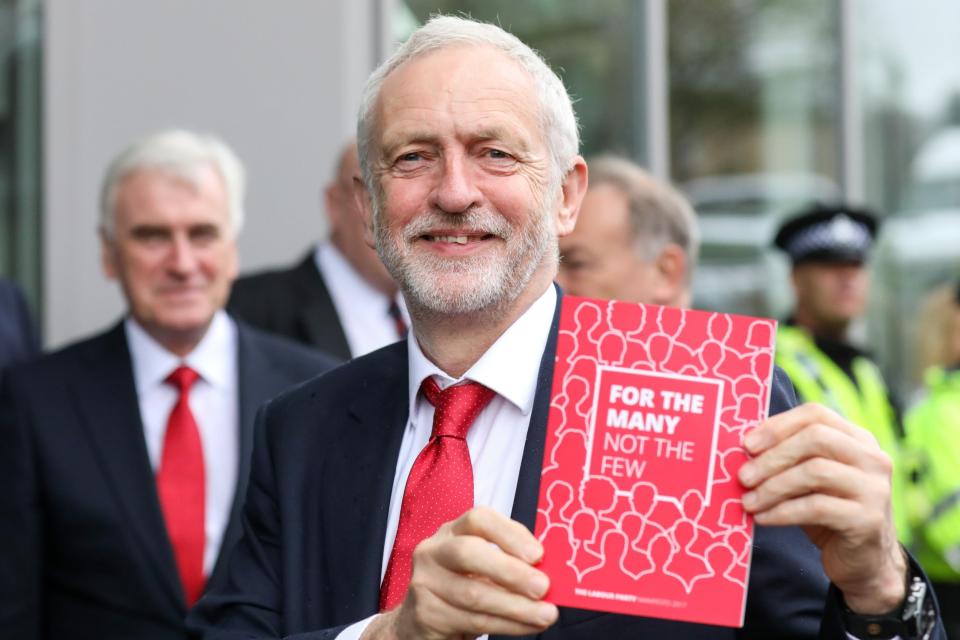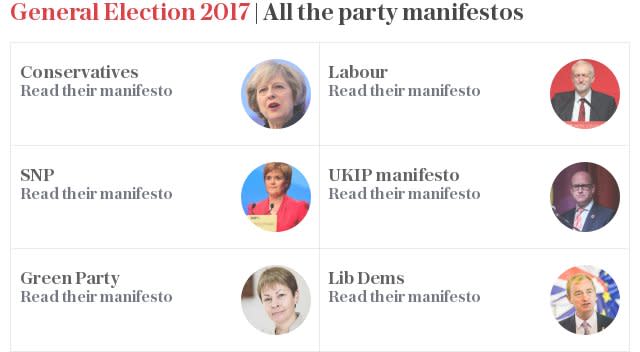Labour manifesto for General Election 2017: Key points, policies and summary

Jeremy Corbyn will go into the General Election pledging to nationalise key industries and take Britain back to the Seventies.
The 43-page document sets out plans to take the energy industry, railways, buses and the Royal Mail back under public control.
It commits Labour to scrapping tuition fees, boosting workers' rights and reversing a series of benefits cuts - including the so-called bedroom tax.
Here are the key points from the Labour manifesto:
Taxation
Hitting 1.2m people earning over £80,000 with rises in income tax.
Bringing the threshold for the 45p rate of income tax down from £150,000 to £80,000.
A new 50p tax will hit all those earning over £123,000.
Raising £19.4billion by raising corporation tax 26 per cent - a rise of more than a third.
Extra powers for HMRC to chase individuals and companies who avoid tax.
Immigration
No commitment to reduce numbers.
Labour "believes in fair rules and reasonable management of migration" and will not resort to "bogus" immigration targets.
Scrap income thresholds for spouses of migrants who want to come to the UK
Creation of a Migrant Impact Fund to support public services in host communities. It will be funded by visa levies and a contributory element from residence visas for high net worth individuals.

Brexit
Labour "accepts the referendum result" and intends to build a close new relationship with Europe "not as members but as partners".
Retain benefits of single market and customs union.
Immediately guarantee existing rights of EU nationals living in Britain and secure reciprocal rights for UK citizens living in another EU country.
No "no deal" option at the end of Article 50 negotiations, with "transitional arrangements" negotiated instead to avoid cliff-edge.
Scrap Great Repeal Bill and replace with EU Rights and Protections Bill.
Rail
Railways brought back into public ownership as franchises expire.
Under public ownership fares will be capped and free WiFi introduced across the network.
HS2 will be completed and will link with a "Crossrail of the North".
Energy
Energy market partially brought back into public ownership.
Creation of at least one publicly owned energy company in every region of the UK.
Central government control of the grid and distribution.
Cap average household dual fuel bills at £1,000 a year.
Ban fracking.
Higher education
Tuition fees abolished and maintenance grants reintroduced for university students.
Health
More than £30billion of extra funding for the NHS through increased income tax for top 5 per cent earners, increased tax on private medical insurance and halving management consultants' fees.
Pay cap scrapped.
EU NHS workers' rights immediately protected.
NHS Sustainability and Transformation Plans halted.
Care
Move towards creation of a National Care Service.
Investment of £8 billion in services over the next parliament, including £1 billion in the first year.
Improve conditions for care workers.
15-minute care visits scrapped.
Carer's Allowance increased to be in line with Jobseeker's Allowance.
Workers' rights
Creation of a Ministry of Labour to deliver investment in enforcing workers' rights.
Repeal Trade Union Act and introduce "sectoral collective bargaining" through unions.
Zero hours contracts outlawed.
Unpaid internships banned.
Employers stopped from only recruiting from overseas.
Bring minimum wage in line with living wage - at least £10 by 2020.
Rights for all workers to have access to trade union.
Paternity leave doubled to four weeks and paternity pay increased.
Protections for women on maternity leave strengthened.
Four new public holidays to mark patron saints' days.
Public inquiry into blacklisting.
Executive pay
A 20:1 limit on gap between the lowest and highest paid workers in companies given Government contracts.
Reduce pay inequality through legislation by introducing an "excessive pay levy" on companies with high numbers of staff on high pay.
Pensioners
"Triple lock" guaranteed throughout next parliament or kept to at least 2.5 per cent.
Winter fuel allowance and free bus passes kept as universal benefits.
Compensation for women born in 50s who had state pension age changed without fair notification.
Housing
Invest to build one million new homes, including 100,000 council and housing association homes by the end of next parliament.
Rent rises capped to inflation and legal minimum standards in properties for rent.
4,000 homes for people with history of rough sleeping.
Welfare
Scrap bedroom tax and reinstate housing benefit for under-21s.
Review cuts to Universal Credit and limits on payments to first two children of families.
Jeremy Corbyn has also pledged to end the benefits freeze - although it's not in the manifesto.
Infrastructure
Borrow to invest £250 billion over 10 years on energy, transport and digital infrastructure.
Improve 4G mobile coverage and invest to bring uninterrupted 5G to all urban areas, major roads and railways.
Democracy
Lower voting age to 16.
Defence
Support the renewal of Trident.
Keep defence spending as 2% of GDP.
Crime
10,000 more police officers for community beats.
Conduct major review of counter-terror Prevent programme.


 Yahoo News
Yahoo News 